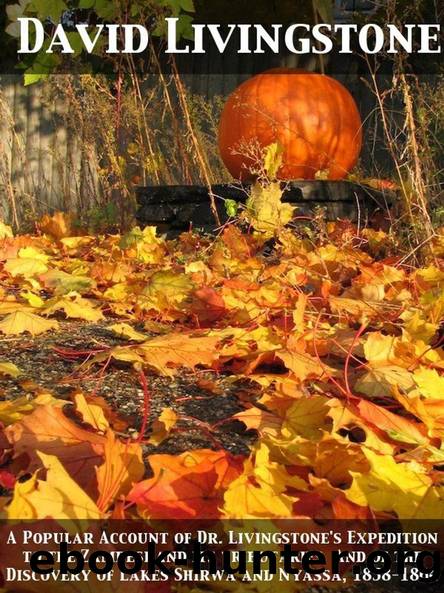A Popular Account of Dr. Livingstone's Expedition to the Zambesi and Its Tributaries and of the Discovery of Lakes Shirwa and Nyassa, 1858-1864 by David Livingstone

Author:David Livingstone [Livingstone, David]
Language: eng
Format: epub
Tags: Classics, Travel, History
ISBN: 9781987045383
Amazon: B000JQU7VC
Barnesnoble: B000JQU7VC
Goodreads: 6532531
Publisher: Barnes & Noble Press
Published: 2019-02-12T00:00:00+00:00
CHAPTER IX.
The waterbuckâDisaster in Kebrabasa rapidsâThe âMa Robertâ foundersâArrival of the âPioneerâ and Bishop Mackenzieâs partyâPortuguese slave-tradeâInterference and liberation.
We arrived at Zumbo, at the mouth of the Loangwa, on the 1st of November. The water being scarcely up to the knee, our land party waded this river with ease. A buffalo was shot on an island opposite Pangolaâs, the ball lodging in the spleen. It was found to have been wounded in the same organ previously, for an iron bullet was imbedded in it, and the wound entirely healed. A great deal of the plant Pistia stratiotes was seen floating in the river. Many people inhabit the right bank about this part, yet the game is very abundant.
As we were taking our breakfast on the morning of the 2nd, the Mambo Kazai, of whom we knew nothing, and his men came with their muskets and large powder-horns to levy a fine, and obtain payment for the wood we used in cooking. But on our replying to his demand that we were English, âOh! are you?â he said; âI thought you were Bazungu (Portuguese). They are the people I take payments from:â and he apologized for his mistake. Bazungu, or Azungu, is a term applied to all foreigners of a light colour, and to Arabs; even to trading slaves if clothed; it probably means foreigners, or visitors,âfrom zunga, to visit or wander,âand the Portuguese were the only foreigners these men had ever seen. As we had no desire to pass for people of that nationâquite the contraryâwe usually made a broad line of demarcation by saying that we were English, and the English neither bought, sold, nor held black people as slaves, but wished to put a stop to the slave-trade altogether.
We called upon our friend, Mpendé, in passing. He provided a hut for us, with new mats spread on the floor. Having told him that we were hurrying on because the rains were near, âAre they near?â eagerly inquired an old counsellor, âand are we to have plenty of rain this year?â We could only say that it was about the usual time for the rains to commence; and that there were the usual indications in great abundance of clouds floating westwards, but that we knew nothing more than they did themselves.
The hippopotami are more wary here than higher up, as the natives hunt them with guns. Having shot one on a shallow sandbank, our men undertook to bring it over to the left bank, in order to cut it up with greater ease. It was a fine fat one, and all rejoiced in the hope of eating the fat for butter, with our hard dry cakes of native meal. Our cook was sent over to cut a choice piece for dinner, but returned with the astonishing intelligence that the carcass was gone. They had been hoodwinked, and were very much ashamed of themselves. A number of Banyai came to assist in rolling it ashore, and asserted that it was all shallow water.
Download
This site does not store any files on its server. We only index and link to content provided by other sites. Please contact the content providers to delete copyright contents if any and email us, we'll remove relevant links or contents immediately.
Fresh from the Country by Miss Read & Brian Flynn(422)
If Only It Were True by Marc Levy(401)
Complete Works of Winston Churchill by Winston Churchill(255)
The Road of Bones to the Arctic Gulag by Anthony Vincent Bruno(231)
A House Full of Men by Parinda Joshi(202)
Chronicles of Sherlock Holmes by David B. Beckwith(197)
How to Draw Manga. Vol. V. Drawing Female Characters by Unknown(191)
John Dough And The Cherub (1906) (L. Frank Baum) by Unknown(190)
0ffbef875ab23ff252e71f7c48b9c417 by Franz Kafka & Kafka Franz(189)
All-Time Best Recipes: From the first 100 issues of America's most reliable food magazine by The Editors of Cook's Illustrated Magazine(185)
Beethoven's Assassins by Andrew Crumey;(179)
Hawthorne, Nathaniel Hawthorne by The house of seven gables(178)
The Reincarnationist Papers by Eric Maikranz(169)
The Four Seasons Collection by Milly Johnson(164)
The Fair Maid of Perth by Sir Walter Scott (Illustrated) by Sir Walter Scott(164)
The Ghosts of Meenambakkam by Ashokamitran(162)
Tuesday Evenings with the Copeton Craft Resistance by Kate Solly(158)
To the Very Last Inch by Heidi Belleau(150)
Kidnapped by Henry Brook(146)
